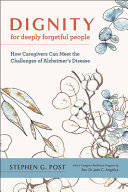2018 School Spending Survey Report
Dignity for Deeply Forgetful People: How Caregivers Can Meet the Challenges of Alzheimer’s Disease
COPY ISBN
 Post (Ctr. for Medical Humanities, Compassionate Care, and Bioethics, SUNY Stony Brook) argues that Western society places too much value on a person’s cognitive abilities and too little value on their personality and humanity, which has negative consequences for the lives of people with Alzheimer’s or other dementia (a group for whom he uses the term “deeply forgetful people” throughout this book). Post’s book proposes a new paradigm of ethical caregiving for deeply forgetful people, with practical aids for their caregivers. For instance, he discusses preemptive physician-assisted dying for people with dementia; Post is against this practice and provides thoughtful reasoning for his position. He also deplores the medicalization of end-of-life care and stresses the importance of establishing advance medical directives and durable powers of attorney while the deeply forgetful person is still able to express their wishes. Post contends that the purpose of caregiving is to preserve the dignity of the person being cared for, and that the only requirement for being treated with dignity is consciousness. Post emphasizes that the ethics of care do not demand self-sacrifice of the caregiver; the book concludes with a caregiver resilience program called “Meeting Alzheimer’s: Learning to Communicate and Connect.”
Post (Ctr. for Medical Humanities, Compassionate Care, and Bioethics, SUNY Stony Brook) argues that Western society places too much value on a person’s cognitive abilities and too little value on their personality and humanity, which has negative consequences for the lives of people with Alzheimer’s or other dementia (a group for whom he uses the term “deeply forgetful people” throughout this book). Post’s book proposes a new paradigm of ethical caregiving for deeply forgetful people, with practical aids for their caregivers. For instance, he discusses preemptive physician-assisted dying for people with dementia; Post is against this practice and provides thoughtful reasoning for his position. He also deplores the medicalization of end-of-life care and stresses the importance of establishing advance medical directives and durable powers of attorney while the deeply forgetful person is still able to express their wishes. Post contends that the purpose of caregiving is to preserve the dignity of the person being cared for, and that the only requirement for being treated with dignity is consciousness. Post emphasizes that the ethics of care do not demand self-sacrifice of the caregiver; the book concludes with a caregiver resilience program called “Meeting Alzheimer’s: Learning to Communicate and Connect.”
VERDICT Essential reading for all caregivers, family, and healthcare providers of deeply forgetful people.
RELATED
ALREADY A SUBSCRIBER? LOG IN
We are currently offering this content for free. Sign up now to activate your personal profile, where you can save articles for future viewing




Comment Policy:
Comment should not be empty !!!